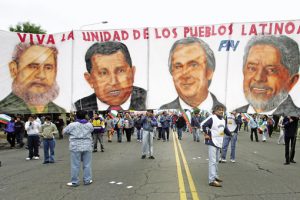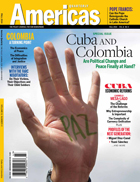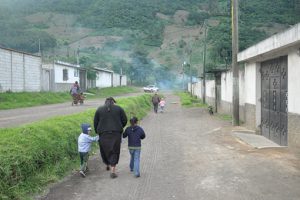The Non-Trade Trade
At the beginning of President Barack Obama’s first term, moves toward normalization between the United States and Cuba briefly seemed possible. Restrictions on travel and remittances were loosened, and Obama hinted at bigger changes during the April 2009 Summit of the Americas in Trinidad and Tobago. However, the political space in the United States quickly … Read more

Cuba and the Summits of the Americas
In the coming months, the United States is going to face a tough choice: either alter its policy toward Cuba or face the virtual collapse of its diplomacy in Latin America. The upcoming Summit of the Americas, the seventh meeting of democratically elected heads of state throughout the Americas, due to convene in April 2015 … Read more
UN Condemns Cuba Embargo in Near-Unanimous Vote
The United Nations General Assembly voted for an end to the U.S. economic embargo of Cuba for the twenty-third time on Tuesday. For the second year in a row, 188 countries voted in favor of a non-binding resolution calling for the end of the embargo, with Palau, Marshall Islands and Micronesia abstaining. Only two countries—Israel … Read more

Cuba and Colombia
Articles: published article?1 A Skeptic’s View on the “Peace Dividend” by Alberto Bernal The economic benefits are neither direct nor certain. The Obstacles to Political Integration Post-Peace by Juanita León The obstacles to political integration. Full text available. Law and Reconciliation in Colombia by Rodrigo Uprimny Yepes and Nelson Camilo Sanchez Here’s how to achieve … Read more
Monday Memo: U.S. Immigration – Petrobras Scandal – Francisco Flores – Private Equity – Chile’s September 11
This week’s likely top stories: Barack Obama delays executive action on immigration; a former Petrobras director names 40 politicians in scandal; former Salvadoran President Flores turns himself in; private equity fundraising in Latin America this year could reach $8 billion; Chileans remember September 11, 1973. Immigration reform stalled: U.S. President Barack Obama’s promise to use … Read more
These Are a Few of My Favorite [AP] Words
If there are two things that inspire me it’s a ramped up, over-the-top, scurrilous AP story about democracy promotion and a Broadway musical–especially a Rodgers and Hammerstein production. So, here is my adaptation of the classic Sound of Music, “My Favorite Things,” based on the recent series of articles published by AP on USAID’s democracy … Read more
Turning Point for Obama and the World
Summer has never been an uneventful period for U.S. President Barack Obama, ever since becoming a candidate for the Presidency in 2007. His dip in political support and public approval often occurs during the sunny months of the summer. This year is no exception. Events in Ferguson, Missouri, showed that the racial divide in America … Read more
Who Are Christian Congressmen Listening To?
Last Friday at 8:37 pm, 223 members of the U.S. House of Representatives voted to expedite the deportation process for unaccompanied Central American children by revising the William Wilberforce Trafficking Victims Protection Reauthorization Act of 2008, even though doing so would deport and endanger children, many of whom would otherwise be eligible for asylum. Shortly … Read more
Dear AP, Sometimes a Democracy Program Is Just a Democracy Program—Even in Cuba
For the past several years, with almost predictable regularity, The Associated Press (AP) has been producing a series of articles supposedly revealing the secret, unaccountable cloak-and-dagger misdeeds of the U.S. Agency for International Development (USAID) in its Cuba program. For all the implied sinister intentions, bureaucratic overreach and shades of John le Carré-like intrigue, though, … Read more

Beyond the Blame Game: Visualizing the Complexity of the Border Crisis
Much has been written and discussed in the last month about the causes of the migration of thousands of undocumented minors and women with young children from Central America’s Northern Triangle region (Guatemala, El Salvador and Honduras) to the United States.[1] The debate has ranged from analyzing the so-called “pull factors” in the U.S. to … Read more
Monday Memo: USAID and Cuba – Mexican Energy – U.S. Immigration – Argentine peso – Bridge in Colombia
This week’s top stories: USAID is accused of running a secret program in Cuba; Mexican energy reform passes in the lower house; U.S. Republicans pass immigration bills before recess; the value of the Argentine peso drops over debt woes; a bridge in Montería, Colombia collapses. USAID and Cuba: In a statement this morning, the United … Read more
Solving the Migration Crisis Requires a Shift in Foreign Policy
This Friday, presidents of the Northern Triangle countries of El Salvador, Guatemala and Honduras will meet with President Barack Obama in Washington DC to deal with the crisis of unaccompanied minors arriving in the U.S. from Central America. Migration between these countries is not new, and has been high on the multilateral agenda for … Read more
Is the U.S. Missing a Free Kick at the World Cup?
The World Cup offers something of a free kick for soccer diplomacy, which some observers say U.S. President Barack Obama is failing to capitalize on. While many nations, from Germany to Russia, are sending their leaders to Brazil to make a diplomatic appearance, Obama is staying home. So is First Lady Michelle Obama and their … Read more


